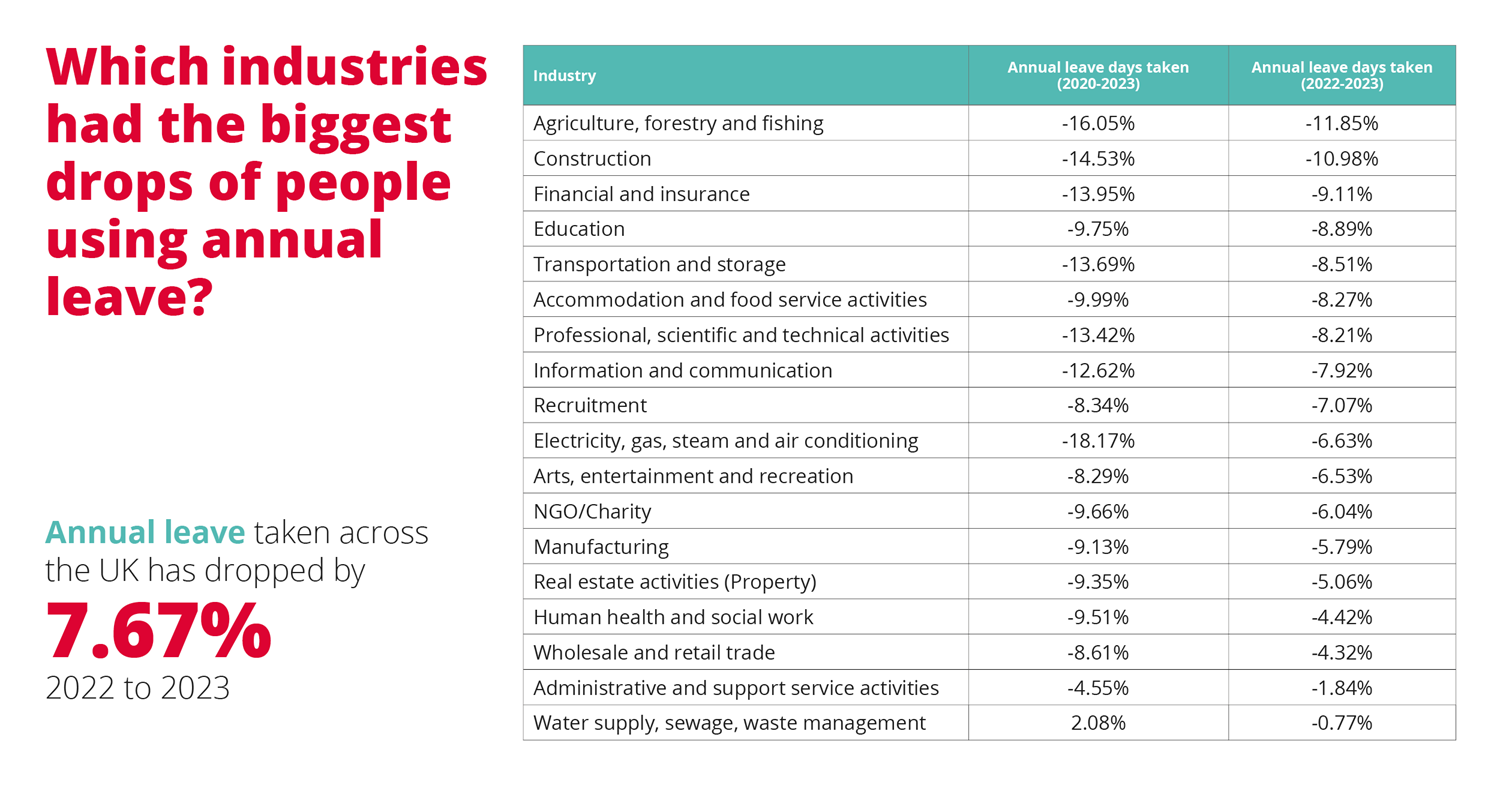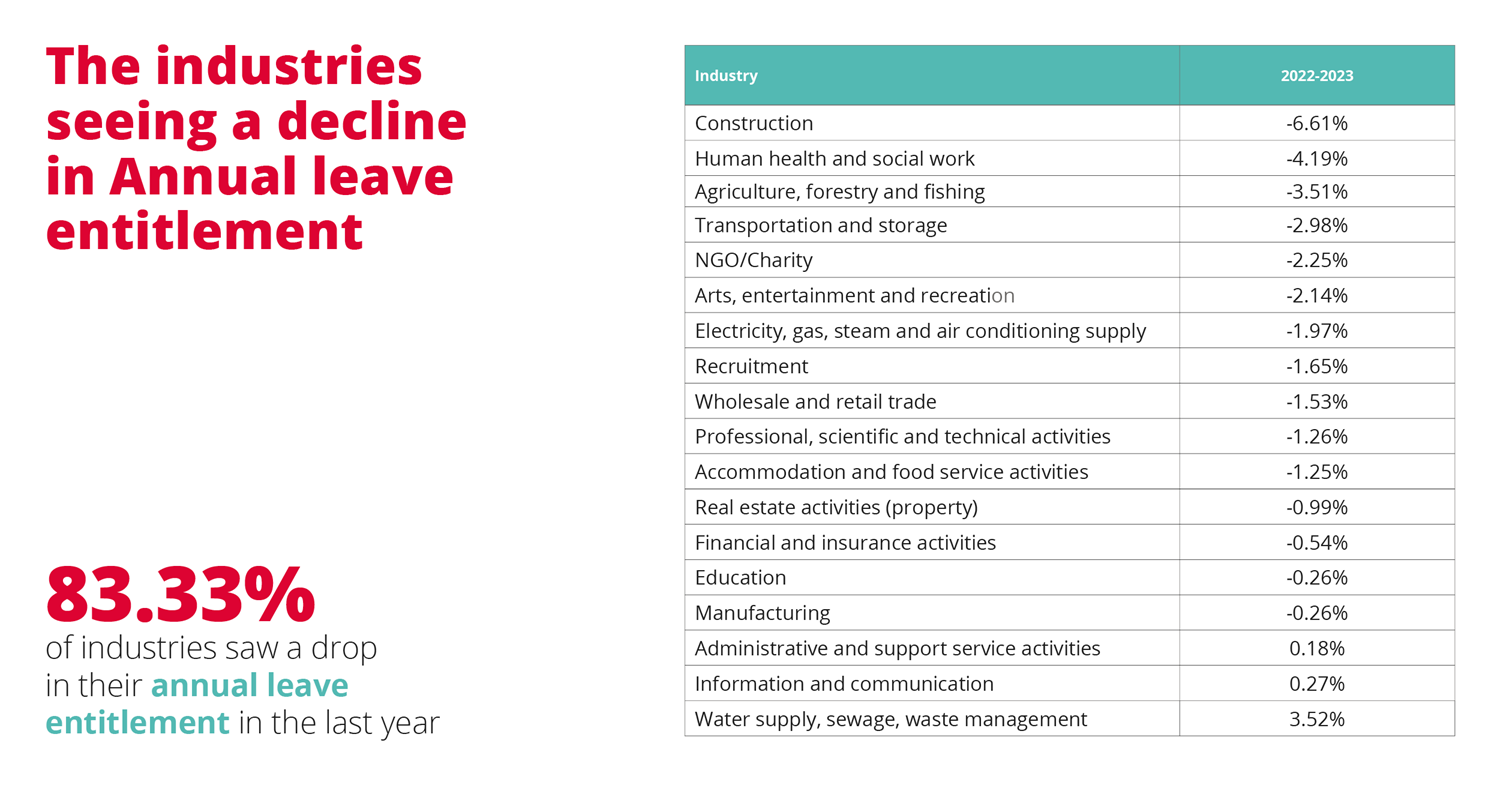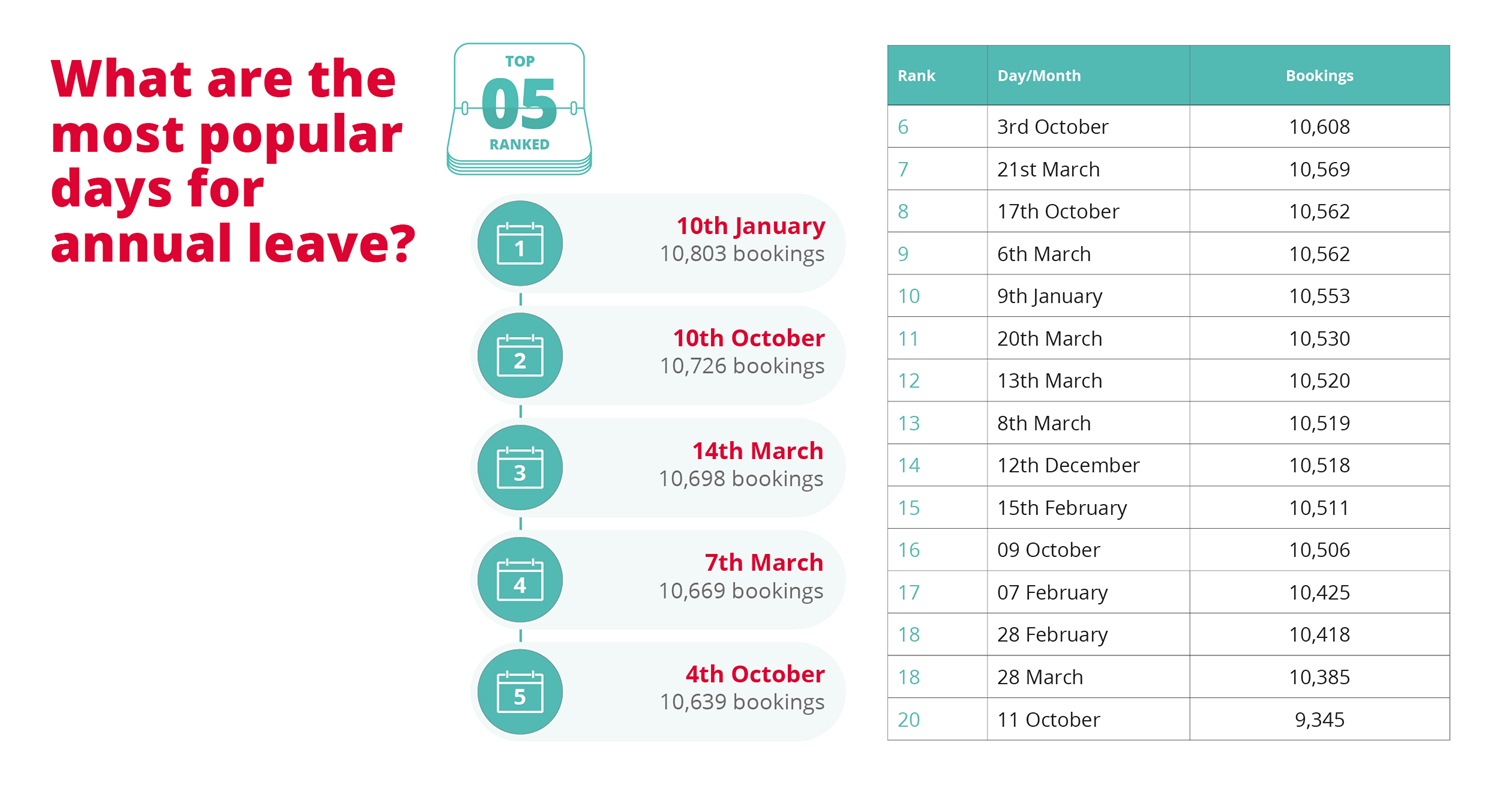
Annual leave is the perfect time for rest and rejuvenation. Whether you plan to spend it with friends and family, soaking up the sun abroad, or starting a new project, taking annual leave is essential to a healthy work-life balance, and it can even boost well-being and productivity by up to 40%.
Full-time workers in the UK are entitled to a minimum of 28 days paid statutory leave, and many employers will encourage their team to book it throughout the year.
However, if employees decide not to use their full entitlement, they could be at greater risk of:
- Burnout
- Health issues like stress or anxiety
- Lower job satisfaction
- Lower levels of motivation
- Unhealthy work-life balance
- Reduced creativity
- Increased sick leave
- Difficulty maintaining personal relationships
While annual leave entitlement is a requirement by law, if annual leave isn’t taken, employers aren't obligated to let it roll over to the following year. That means employees could be working over their contracted hours – for free. HR software can encourage employees to book annual leave because it’s easy to request holidays, they can track their allocation, and it helps managers to be aware of when they need to nudge people to book more time off.
Our research has found that the number of annual leave days people have taken has dropped substantially across the UK and by all industries.
Key takeaways: The status of annual leave in the UK
PeopleHR has looked at annual leave data tracked by over 3,000 companies in 18 industries in the UK to reveal that:
- Annual leave taken across the UK has dropped by 7.67% from 2022 to 2023.
- Since 2020, the amount of annual leave taken has dropped by almost 12% – from an average of 38 days per employee to 34 in 2023.
- The top industries giving up their annual leave are agriculture (-11.85%), construction (-10.98%) and financial services (-9.11%).
The average employee in the UK took 33.9 days of annual leave in the last year - down from 36.7 in 2022, and 38 in 2020, including bank holidays. However, not all companies mandate that their staff take off bank holidays, instead opting to give them extra annual leave and allow people to take it off when best suits them.
Reasons for the drop in people taking annual leave remain uncertain, however it may be because they feel too busy to take time off, or can’t afford to justify holidays abroad during the cost of living crisis. Unlimited holiday is now also becoming an ‘employee benefit’ for some companies when recruiting, but can lack clarity and mean people aren’t held to account to take off a certain amount of days.
Alternatively, some companies offer the ability to “sell back” a certain amount of unused annual leave entitlement - which some staff may be exploring to top up their salary.
Which industries had the biggest drops of people using annual leave?

All industries saw a decline in the number of annual leave days taken last year but agriculture, forestry and fishing had the largest decline with an 11.85% drop in annual leave days taken per employee. The average UK holiday allowance also dropped by 3.51% from 2022-2023.
The farming industry did have a particularly challenging year with rising costs and a labour shortage, which could have increased the pressure and workload of existing employees. They may have felt too busy to take it.
The construction industry found itself in a similar situation with the number of annual leave days taken dropping by 10.98%. Their average holiday entitlement in the UK also reduced from 34.85 days down to 32.55 days, a drop of 6.61% – the greatest out of all the industries.
The construction sector also faced a labour shortage, and the pressure for employees could become greater as experts predict an extra 225,000 construction workers are required by 2027.
The financial services sector saw a 9.11% decline in the number of annual leave days taken, despite their entitlement only dropping by 0.54%. The sector is high-pressured and competitive with employees often having large workloads to manage. Research found that 27% of financial services professionals agree that extra time off would help to reduce burnout.
Other sectors that saw a decline in annual leave taken include education (8.89%) and transportation and storage (8.51%). The education sector faced many challenges in 2023 with teacher strikes and shortages, as did the transportation sector with rising fuel costs and inflation. This could have led to increased pressure and workloads, which may have influenced the employees decision not to take annual leave.
The greatest increase to annual leave entitlement was seen in the water supply, sewage and waste management sector. The entitlement increased by 3.52% and they had the smallest decline of annual leave days taken (0.77%).
Holiday entitlement - The industries seeing a decline
The study revealed that 83.33% of industries saw a drop in their holiday entitlement in the last year. Only three industries saw an increase, which was administrative and support services (0.18%), information and communication (0.27%), and water supply, sewage and waste management (3.52%).
The minimum annual leave entitlement for a full time worker is 28 days. Some workplaces may offer a higher entitlement, and depending on the employee’s length of service, this may increase every year.

When are the most popular days for annual leave?
What days are most popular for people to book off? PeopleHR looked at data from 2023, to understand what dates are most requested for annual leave. We omitted any dates that were either side of a bank holiday. Surprisingly, no summer date featured on the list, suggesting people are choosing to book annual leave outside of “peak times”.

Out of the 20 days, there were eight days booked in March – the highest out of each month. March marks the start of Spring, so with the weather turning warmer, it may have been an incentive for people to spend more time outside of work.
The 15th February proved popular with 10,511 bookings, most likely because it was Valentine’s Day the day before.
From the top 20 days, the only day booked off in December was the 12th with 10,518 bookings. It’s usually a busy month for the public with the run up to Christmas, but there could be greater restrictions around booking annual leave, especially in industries like retail which normally operate longer hours.
There may also be less incentive to book annual leave in December as some workplaces offer time off for Christmas, and employees may be working to finish projects before the start of the new year.
What reasons are there for the decline in annual leave uptake?
- Work culture and expectations: In many industries, if employees feel overworked, they may prioritise work commitment over personal time off.
- Staff shortages: If people are experiencing a high workload, it may create pressure on employees to remain constantly available, making it challenging for them to take leave without compromising productivity.
- Peak times: Industries with seasonal work patterns, such as retail, accommodation and hospitality, may limit employees’ flexibility in taking time off during peak periods.
- Blurred lines: Advancements in hybrid work following the coronavirus might blur the boundaries between work and personal lives, making it challenging for employees to disengage and take leave.
- Fear of falling behind: Competitive industries like finance, technology, and professional services may foster a culture where employees fear falling behind their peers if they take extended breaks.
- Unlimited annual leave: For some people, the limitless choice afforded by ‘unlimited leave’ as a perk can be more overwhelming - and cause people to take fewer days off, not more. Read our dedicated guide for more information on unlimited annual leave policies.
How can businesses help to ensure all annual leave is taken?
Despite the staff shortages that many industries are experiencing, employees should be encouraged to book annual leave so that they get regular breaks throughout the year. To support them, the booking process should be made simple.
HRIS software is key to streamlining your booking process, managing shifts and timesheets, and any absence. Employees can use a mobile app to see their entitlement, and request or cancel leave at the touch of a button. The simplified booking process means they can self-serve, plan their time better, and make requests from any device or remotely.
Companies and employers also have complete visibility over annual leave requests, so that they can see any clashes or issues, and respond quickly. You can also keep a track of who hasn’t booked leave, to flag it with them, and you can arrange adequate cover if you know staff will be on leave.
Modern HR software saves you and your HR team valuable time, so instead of manually handling leave requests, you can quickly manage requests from a single, digital system.
Charles Butterworth, Managing Director of the People Division at The Access Group, said:
Workers across the UK are under a great deal of pressure with rising household expenses, work-related stress and personal commitments. It’s more important than ever that people take time off to rest and recharge – so that they can come back stronger.
But taking holidays should never feel like it’s part of the job. As revealed in the report, the number of employees taking their full annual leave entitlement has declined in all industries. There could be many reasons for this, like poor planning, anxiety about falling behind, or a heavy workload. Ultimately, it’s our duty as employers to help our teams book time off, whether this is through regular reminders or implementing a simple and efficient booking system.
Companies need to take action and investigate why employees are reluctant to take time off, so that they can put strategies in place to support them. It’s also essential that companies and employers have a clear view of any requests, so that they can manage them instantly.
If you’re considering new HRIS software to ensure you have full visibility of annual leave across your organisation, you can find out how to effectively prepare for your HR software implementation in our guide for SMBs.
ENDS
Methodology
The study conducted by PeopleHR analysed data from 18 industries and 3,068 companies employees. The data was gathered from 2020-2023.
Data correct as of January 2024.
